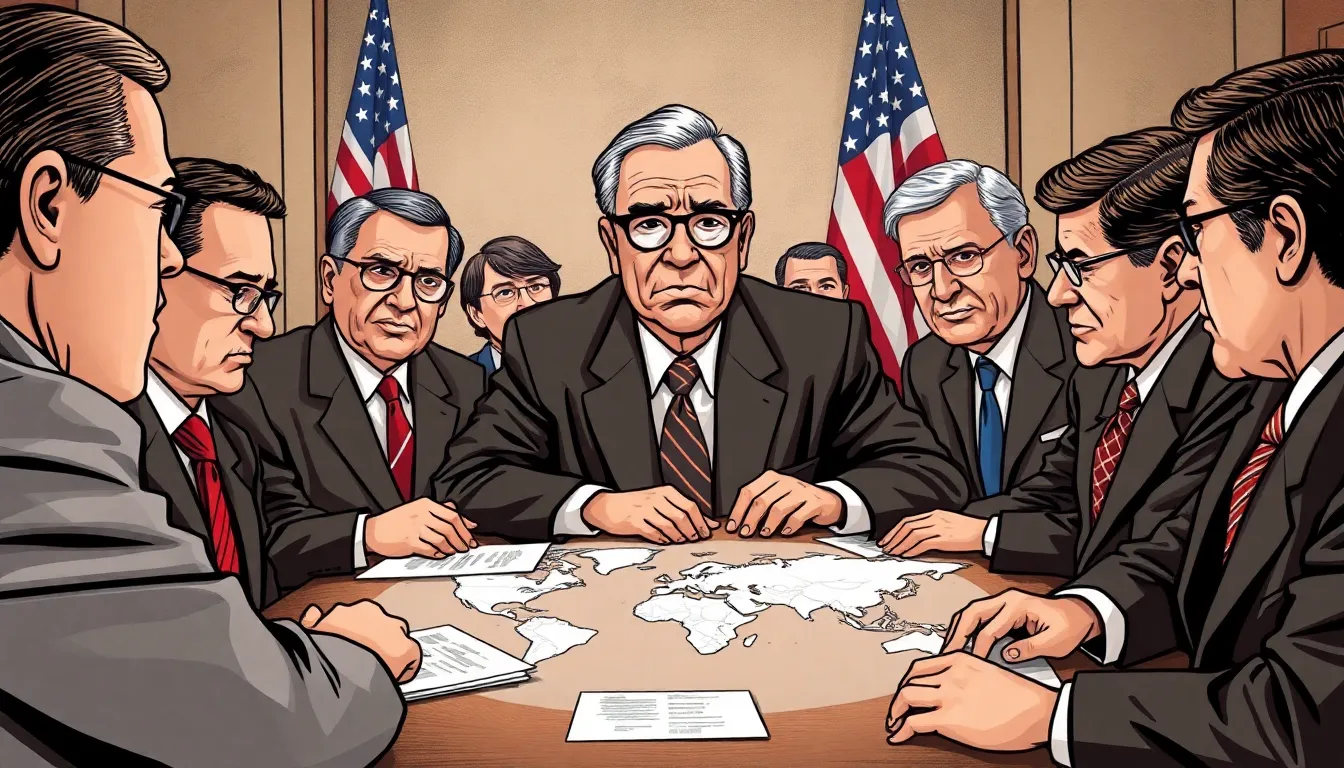In the colorful world of politics, the term “neocon” often pops up like an unexpected plot twist in a political thriller. But what exactly does it mean? Picture a group of political strategists who believe that spreading democracy is as essential as finding the best pizza in town. These folks, known as neoconservatives, advocate for an assertive foreign policy, believing that a little intervention can go a long way—kind of like adding extra cheese to your favorite slice.
Neocons emerged in the late 20th century, armed with ideas that blend traditional conservatism with a dash of idealism. They’ve stirred debates, sparked controversies, and sometimes left people scratching their heads. So, if you’re curious about these political players and their impact on global affairs, buckle up. It’s time to dive into the fascinating world of neoconservatism and uncover what makes them tick.
what is a neocon in politics
Neoconservatism emerged in the mid-20th century among disillusioned liberals in the United States. This political movement emphasizes a strong commitment to democracy and aims to promote democratic values globally. Neoconservatives advocate for an assertive foreign policy, believing military intervention can foster democracy in other nations. Their approach often includes the use of military force when deemed necessary.
A focus on traditional values characterizes neoconservative thought, blending elements of social conservatism with foreign policy idealism. Economic policies also reflect a commitment to free-market principles, promoting capitalism as a means to enhance prosperity and stability. Prominent neoconservative figures, such as Paul Wolfowitz and Donald Rumsfeld, shaped the movement’s direction during the early 21st century.
Debates surrounding neoconservatism center on its impact on global relations and the effectiveness of its policies. Critics argue that interventionist strategies can lead to unintended consequences, such as regional instability. Supporters maintain that spreading democracy constitutes a moral imperative, contributing to a safer and more just world.
Public perception of neoconservatives varies, with some viewing them as idealistic visionaries while others see them as overly aggressive. The movement’s influence remains significant, particularly within the Republican Party, shaping discussions about U.S. foreign policy. Understanding neoconservatism provides valuable insights into contemporary political dynamics and global affairs.
Historical Context

Neoconservatism emerged during the mid-20th century, driven by a desire to reshape American political thought. The movement represents a blend of traditional conservatism and idealism, primarily in response to disillusionment with liberal policies.
The Origins Of Neoconservatism
Neoconservatism originated in the 1960s, primarily among intellectuals who previously identified as liberals. It developed as a reaction to the perceived failures of the welfare state and the anti-Vietnam War sentiment. Founders advocated for a more robust foreign policy focused on promoting democracy worldwide. Political discussions increasingly included notions of moral responsibility and intervention in global affairs. The conjunction of these factors solidified neoconservative principles within the conservative movement.
Key Figures In Neocon Politics
Prominent figures significantly shaped neoconservatism and its political strategies. Irving Kristol, often referred to as the “godfather” of neoconservatism, advocated merging conservative and liberal values. Paul Wolfowitz and Donald Rumsfeld played pivotal roles, especially during the Bush administration, emphasizing military intervention to promote democracy. Additionally, figures like Richard Perle and Elliott Abrams contributed to policy discussions surrounding U.S. foreign relations. Their influence persisted through various political events, highlighting the complexities of neoconservative ideology within contemporary politics.
Core Beliefs And Principles
Neoconservatism revolves around distinct beliefs that shape both foreign and domestic policies.
Foreign Policy Perspectives
Neoconservatives advocate for an assertive foreign policy focused on spreading democracy worldwide. Military intervention often serves as a tool to promote democratic values, particularly in regions perceived as authoritarian. Their strategy typically includes using American power to confront rogue states and fight terrorism. Engagement in international alliances also appears pivotal for ensuring collective security, while promoting human rights remains part of their mission. They view the United States as a force for good, responsible for ensuring the stability of democratic governments across the globe.
Domestic Policy Beliefs
Domestic policies within neoconservatism emphasize traditional values along with promoting free-market economics. Strong support for capitalism remains a cornerstone, advocating minimal government intervention in markets. Education reform plays a significant role, with a focus on school choice to enhance educational opportunities. Social issues often correlate with their beliefs, promoting family structures and moral values. They support welfare reform aiming to encourage self-reliance and reduce dependency on government programs. Through these policies, neoconservatives seek to reinforce individual responsibility and promote economic growth.
Influence On American Politics
Neoconservatives wield significant influence in American politics, particularly within the Republican Party.
Neocons In The Republican Party
Neoconservatives often shape party platforms, emphasizing strong national defense and interventionist foreign policies. Prominent figures like Paul Wolfowitz and Donald Rumsfeld play crucial roles in advocating these principles. Their strategies resonate with party members who prioritize democracy promotion. Collaboration among neoconservative leaders and traditional conservatives occurs frequently, enhancing their political power. The neoconservative focus on free-market economics appeals to party supporters, aligning with overall Republican values. As a result, neocons maintain a lasting presence in the party’s debates and policy decisions.
Impact On U.S. Foreign Policy
Neoconservatives significantly impact U.S. foreign policy strategies aimed at spreading democracy. Advocacy for military intervention in regions like the Middle East illustrates their commitment to confronting authoritarian regimes. Critics often argue that such approaches lead to unintended consequences, urging caution in military engagements. Supporters, however, believe that U.S. involvement fosters global stability and protects human rights. Neoconservative ideologies shape discussions within the government, influencing legislative decisions and diplomatic efforts. Their perspectives on foreign policy continue to provoke debate among political analysts and citizens alike.
Criticisms And Controversies
Neoconservatism faces persistent criticism from various political spectrums, highlighting contentious ideologies and policies.
Opposition From The Left
Critics on the left often argue that neoconservatism promotes an aggressive foreign policy that leads to unnecessary military interventions. Many believe this results in destabilizing regions rather than fostering democracy. They cite wars in Iraq and Afghanistan as examples of neoconservative policies causing civilian casualties and prolonged conflict. Attention is drawn to the perception that neoconservatives ignore diplomatic solutions while prioritizing force. Additionally, leftist opponents argue that these actions distract from domestic issues, including education inequality and healthcare access.
Challenges From The Right
Within the right, some conservatives express opposition to neoconservatism’s interventionist stance. These traditionalists prioritize limited government and fiscal conservatism over military engagement. Caution arises around extensive foreign commitments, which detractors say can lead to overreach and entanglement in foreign affairs. Voices from this segment express concern that neoconservative policies stray from constitutional principles, diverging from the foundational values of American conservatism. Discontent grows with neoconservatives’ approach to free trade, as some right-wing factions advocate for protectionism over globalist agendas.
Conclusion
Neoconservatism remains a powerful force in American politics influencing both foreign and domestic policies. Its advocates continue to champion military intervention as a means to promote democracy and uphold human rights. However the movement faces significant scrutiny from various political factions. Critics question the efficacy of interventionist strategies while some conservatives push back against its expansive foreign commitments.
As debates surrounding neoconservatism persist the complexity of its ideology and impact on global affairs can’t be overlooked. The ongoing discussions reflect broader concerns about the balance between national interests and moral imperatives in shaping U.S. policy. Understanding neoconservatism is essential for grasping the current political landscape and its implications for future governance.




